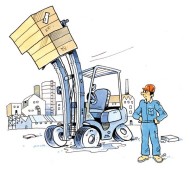 David Ellison, Fork Lift Truck Association Chief Executive
David Ellison, Fork Lift Truck Association Chief Executive
When times are hard and cash flow is poor, cutting corners becomes very tempting. Even bosses who once prided themselves on running a tight ship might try and shave a little bit here and there from what they know as good practice.
But scaled down production, finance and staff levels should never be an excuse for scaling back on safety. After all, the real price of a safety lapse is much more than any savings made. It could cost you your job, your business or even your life.
We all know how important safety is in the workplace, but sometimes it is worth considering the potential consequences of placing saving money before saving lives in the three most common cost-trimming areas.
Training
Quite often, when times get tough, training is one of the first budgets to be cut. That may be all right when it comes to ‘soft skills’ as they can be reinforced later. But think hard before slashing operator training: it has a direct impact on safety.
One of the key responsibilities of any company operating fork lift trucks is to ensure that all of its operators are fully trained on the equipment they are using. Every operator should have their training needs monitored and reassessed on a regular basis. Neglecting this responsibility is criminal. And, careful reassessment can actually reduce the need to routinely book expensive refresher training at fixed intervals.
Fork lift truck users frequently turn to the FLTA for advice on training. Common scenarios we hear include:
Jim can train the rest – can’t he?
No, Jim can’t train the rest, unless he is a trained trainer and preferably registered with one of the accrediting bodies.
That articulated truck is just like any other counterbalance – isn’t it?
No. The operator skills are very different and additional training is required.
A Bulgarian licence is fine – don’t you think?
It may be, but that’s not the point. Employers are responsible for making sure all employees have the right training. An operator’s skills should be checked by an expert before a permit to operate is issued.
Operations
For many companies, trimming budgets will affect what equipment is available to them and – more importantly – how they use it. It’s not uncommon for companies to consider using equipment in ways that it wasn’t designed for. Sometimes you can get away with it, often you don’t. That’s a risk you take… if you don’t worry too much about safety.
At the FLTA, we’re contacted regularly by fork lift truck users with questions such as:
The reach trucks can operate in the yard – can’t they?
Probably not: most reach trucks are not designed for rough or unstable ground.
The truck can carry two pallets if it goes a bit slower – can’t it?
You need to consider if two pallets are still within the rated capacity. Also, is the load stable, and can the operator still see clearly?
Everything would be quicker without the one-way circuit – wouldn’t it?
A one-way circuit would have been implemented for a reason. Just because jobs become quicker doesn’t necessarily mean that they are running safely.
Even though fork lift trucks are large, heavy and extremely capable machines, the truth is that each and every one has been designed to fulfil a specific role. By encouraging or allowing fork lift trucks to operate outside of their design characteristics, you become responsible for any accidents which result. So, if you have multiple functions to perform, you may need to buy or hire equipment for those tasks.
Maintenance
Cutting back on maintenance can have serious repercussions for fork lift truck users. Failure to keep trucks in good order can lead to serious accidents and expose you to the full weight of the law. Under PUWER 98, fork lift truck users must ensure that machines are correctly maintained.
For some bosses, it may be tempting to delay servicing and new parts as finances tighten. This can be a risky decision. Consider the following questions received from fork lift truck users:
It won’t matter if we delay the next service by a few months – will it?
You can guarantee that if you put off maintenance the truck will break down soon enough – and probably at the most inconvenient time.
The tyres are worn, but they are good for another 500 hours – aren’t they?
A worn tyre will eventually go flat or, even worse, come off its rim – blocking a major thoroughfare.
Nobody ever checks the date of the Thorough Examination – do they?
Suppose one of your fork lift trucks hits a stanchion. The enforcing officer will ask to see Reports of Thorough Examination for the truck involved – as well as all of your other trucks.
A pre-shift check could just be done on a Monday morning – surely?
Cutting back on pre-shift checks could lead to maintenance issues, such as hydraulic oil leaks, going unnoticed until later in the week – making the problem worse and more expensive to fix.
 A well-planned system of daily or pre-shift checks is the cornerstone of good maintenance. This ensures that essential fluids are kept topped up and potential defects are identified before they become a problem. Regular preventive maintenance should be scheduled in accordance with the recommendations of the manufacturer of your equipment.
A well-planned system of daily or pre-shift checks is the cornerstone of good maintenance. This ensures that essential fluids are kept topped up and potential defects are identified before they become a problem. Regular preventive maintenance should be scheduled in accordance with the recommendations of the manufacturer of your equipment.
So, if your business is feeling the crunch, don’t cut corners with safety matters. The cost to your business can be far higher than you may think – and then where would you be? That’s one question we will leave you to answer for yourself.
The Fork Lift Truck Association Tel: 01256 381441 Email: mail@fork-truck.org.uk www.fork-truck.org.uk




2 Comments
very interesting article great to read.
I whole heartedly agree with the comments made in this article, especially with regards to cutting back on maintenance. As the parts coordinator for Nationwide Handling I often get calls when a truck or piece of lifting equipment has failed because of broken wheels or lack of a scheduled maintenance plan. This results in downtime with the associated cost to the business and could have been avoided with a planned maintenance schedule. It really is a false economy to delay or neglect maintenance of any type of lifting equipment. Plus, without a planned maintenance contract in place there is also the issue of Health & Safety and Operator Safety.